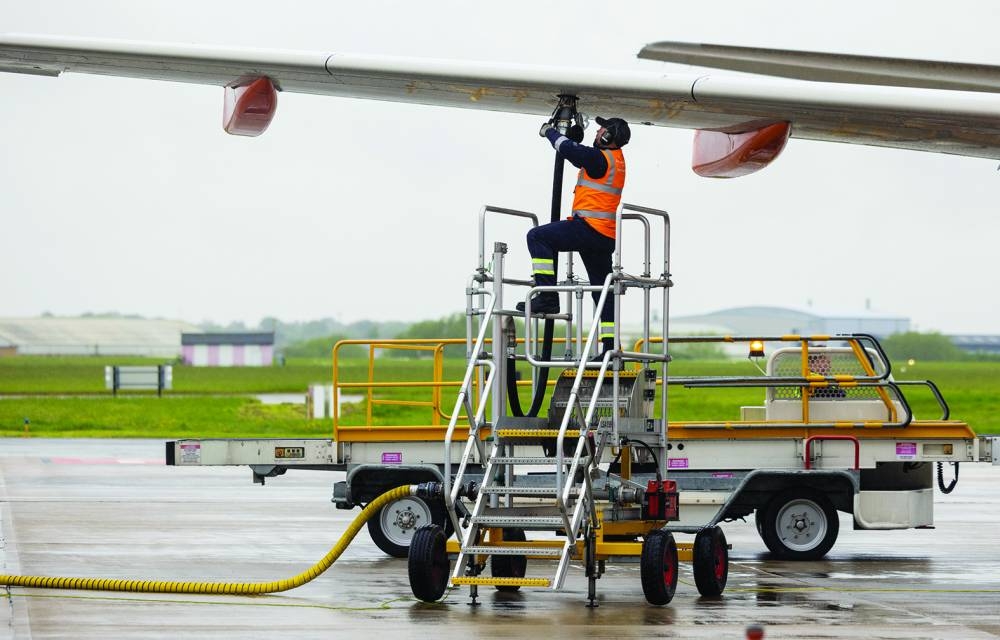Business
Higher jet fuel costs still pose challenge for airlines despite recent decline
Aviation Page - Beyond the Tarmac

An employee attaches a refuelling hose to an EasyJet passenger aircraft at London Southend Airport. The recent drop in jet fuel prices provides some financial relief, but airlines are still grappling with the long-term impact of fuel costs.
The global average jet fuel price fell to $98.68/barrel as of July 26, down 2.1% compared to the week before.
Jet fuel price, industry analysts say marked a significant 40% plus decrease from their peak in 2022.
This reduction is generally seen as a welcome shift for the aviation industry, which faced severe financial strains due to soaring fuel costs in the wake of the Covid-19 pandemic.
According to Statista, the current price of $2.39 per gallon represents a substantial decrease from the 2022 highs, reflecting a more stable period for fuel costs.
However, the US Energy Information Administration (EIA) notes that current prices remain elevated compared to pre-pandemic levels, where prices were consistently between $1.80 and $1.90 per gallon in 2019.
Despite the recent decline, high fuel costs continue to pose a challenge for airlines, impacting their operational expenses and profitability, financial analyst Noris Soto wrote in Invezz, which is an online investor platform.
The recent drop in jet fuel prices provides some financial relief, but airlines are still grappling with the long-term impact of fuel costs.
“The complex interplay between fuel prices, consumer demand, and industry regulations influences airline ticket prices,” Soto noted.
Elevated fuel costs, combined with significant taxes and airport fees, often get passed on to consumers, affecting ticket affordability.
Projections suggest that while jet fuel prices may remain stable, they will continue to impact the cost structure of airlines.
This ongoing economic uncertainty requires the industry to navigate challenges with resilience and adaptability.
According to Soto, airlines employ various strategies to manage the financial impact of fluctuating fuel prices.
Fuel hedging is a key tactic, allowing airlines to lock in fuel prices at favourable rates and shield themselves from sudden price spikes.
Additionally, airlines focus on operational efficiency improvements and fleet modernisation to reduce fuel consumption and lower costs.
Other strategies include adjusting ticket prices, flexible scheduling, and capacity management.
By implementing these measures, airlines aim to maintain operational stability and financial health despite volatile fuel markets.
Global body of airlines - IATA forecasts that the average cost of jet fuel in 2024 will be roughly $2.7095/gallon, up from the $2.6643/gallon average forecasted for 20232.
The jet fuel price is expected to average $113.8/barrel in 2024, translating into a total fuel bill of $281bn, accounting for 31% of all operating costs, IATA noted recently.
Fuel is a major cost component of operating an airline, often accounting for 20-30% of operating costs, according to OAG, a UK-based global travel data provider.
Fuel is such a large cost for airlines that it is the focus of intense efforts across the industry to find efficiency improvements.
Such gains can take a variety of forms including replacing fleet with new aircraft, more efficient operations and efforts to persuade governments to remove the airspace and airport inefficiencies that waste around 5% of fuel burned each year.
Industry experts say fuel costs constitute roughly one-third of an airline’s operating costs. Hence, a marginal change in crude oil prices can significantly impact its profitability.
Jet fuel prices have long driven airline profitability and the aviation industry as a whole, representing between 14% and as much as 31% of airline operating costs in the past decade, an estimate shows.
Consequently, airlines hedge a large portion of their annual fuel consumption at lower oil prices in order to protect themselves from the volatility in oil prices.
Many experts have called for increased use of sustainable aviation fuel (SAF) to tide over the crisis.
But according to IATA, the global production of sustainable aviation fuel (SAF) is only about 100mn litres a year, or 0.1% of all aviation fuel used.
Various airlines have, however, committed to bringing this figure to 10% by 2030, a truly ambitious goal.
Pratap John is Business Editor at Gulf Times. Twitter handle: @PratapJohn

